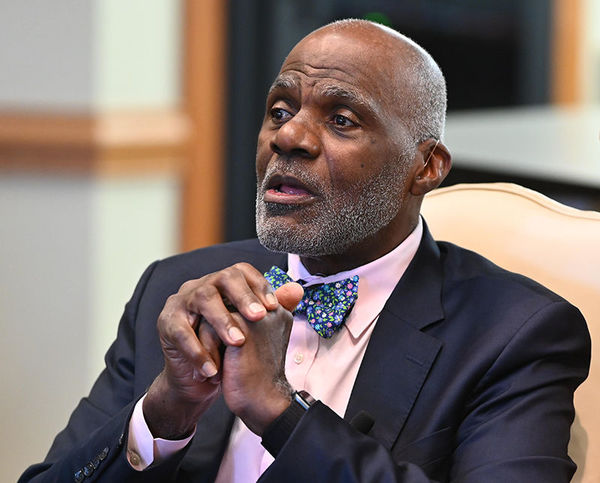
In a wide-ranging conversation at Notre Dame Law School, former Minnesota Supreme Court Justice Alan Page expressed both his deep concern, and his enduring hope, for the future.
Justice Page spoke with Klau Center director Jennifer Mason McAward on Friday, October 11 as a guest of the Law School, the Klau Center, the Sports, Communications and Entertainment Law Forum, and Black Students Law Association. A 1967 alumnus of Notre Dame, he went on to a highly successful career in professional football. Justice Page earned his law degree at the University of Minnesota and served on the state’s high court for 22 years.
Reflecting upon a lifetime of work focused on equal justice under the law, Justice Page was frank about the realities he faced early on, even at Notre Dame in the mid-1960s. “When you’re one of 30 students of color on a campus, it just is what it is,” he remarked. “And quite frankly there were 30 students, but there were places that didn’t have any. And not by accident, but by design.” Nonetheless, he said, “I understand the value of being in a position in which you learn to function in what some might consider adverse circumstances.”
Justice Page also offered his views on numerous issues of current concern. Asked about a seeming polarization of the judiciary, he responded, “A judge’s role is to exercise his or her judgement, not his or her will. It is that simple…As a judge you have to be able to make difficult decisions that are inconsistent with your personal preference.” Concerning the tendency of ideology and self-promotion to drive judicial nominations, his assessment was grim. “The Supreme Court has decided, rightly or wrongly…that a judge’s right to speak, their right to free expression, is more important than a criminal defendant’s right to due process, quite frankly.”
“We are I think, at a crossroads when it come to our character, and how we individually and collectively go forward will determine our futures.”
Concerning the debate over public monuments, Justice Page expressed a concern to retain historical memory while providing context. “It is vitally important that when we have conversations about whether we should remove monuments,” he said. “When somebody makes the argument that a statue of Robert E. Lee should stay…because it’s a recognition of our history and out past, well, I want that slave collar there so people understand just what that history and that past is.”
Of particular concern was the current social atmosphere, in which a common recognition of fact and truthfulness seems to be slipping away. “We live in a perilous time,” observed Justice Page. “And the peril is from within. We are I think, at a crossroads when it come to our character, and how we individually and collectively go forward will determine our futures… One of the biggest concerns I have at the moment is this notion that we can lie and it doesn’t matter…I think that is a real danger to us as a society, to us individually.“
Balanced against his caution, Justice Page maintained throughout the conversation a measured faith in individual responsibility. “We all have within us the power and the ability to work towards whatever the objective is,” he reminded the audience. “To try and make this world a better place. To try and ensure justice. To bend the moral arc. We all have that power.”